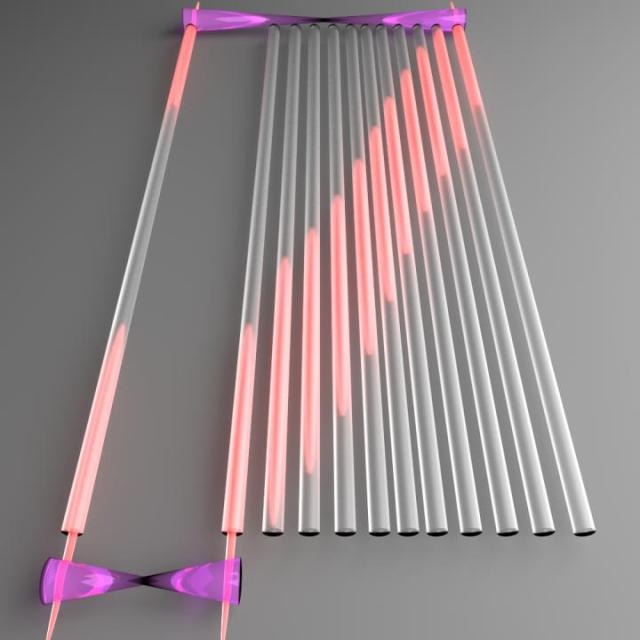Apr 19 2016
RMIT University researchers have trialled a quantum processor capable of routing quantum information from different locations in a critical breakthrough for quantum computing.
 Quantum information is encoded in single particles of light (photons). The perfect state transfer is applied to one photon of an entangled pair, relocating it to a distant location while preserving the delicate quantum information and entanglement. (Credit: RMIT University)
Quantum information is encoded in single particles of light (photons). The perfect state transfer is applied to one photon of an entangled pair, relocating it to a distant location while preserving the delicate quantum information and entanglement. (Credit: RMIT University)
The work opens a pathway towards the "quantum data bus", a vital component of future quantum technologies.
The research team from the Quantum Photonics Laboratory at RMIT in Melbourne, Australia, the Institute for Photonics and Nanotechnologies of the CNR in Italy and the South University of Science and Technology of China, have demonstrated for the first time the perfect state transfer of an entangled quantum bit (qubit) on an integrated photonic device.
Quantum Photonics Laboratory Director Dr Alberto Peruzzo said after more than a decade of global research in the specialised area, the RMIT results were highly anticipated.
"The perfect state transfer has emerged as a promising technique for data routing in large-scale quantum computers," Peruzzo said.
"The last 10 years has seen a wealth of theoretical proposals but until now it has never been experimentally realised.
"Our device uses highly optimised quantum tunnelling to relocate qubits between distant sites.
"It's a breakthrough that has the potential to open up quantum computing in the near future."
The difference between standard computing and quantum computing is comparable to solving problems over an eternity compared to a short time.
"Quantum computers promise to solve vital tasks that are currently unmanageable on today's standard computers and the need to delve deeper in this area has motivated a worldwide scientific and engineering effort to develop quantum technologies," Peruzzo said.
"It could make the critical difference for discovering new drugs, developing a perfectly secure quantum Internet and even improving facial recognition.''
Peruzzo said a key requirement for any information technology, along with processors and memories, is the ability to relocate data between locations.
Full scale quantum computers will contain millions, if not billions, of quantum bits (qubits) all interconnected, to achieve computational power undreamed of today.
While today's microprocessors use data buses that route single bits of information, transferring quantum information is a far greater challenge due to the intrinsic fragility of quantum states.
"Great progress has been made in the past decade, increasing the power and complexity of quantum processors," Peruzzo said.
Robert Chapman, an RMIT PhD student working on the experiment, said the protocol they developed could be implemented in large scale quantum computing architectures, where interconnection between qubits will be essential.
"We experimentally relocate qubits, encoded in single particles of light, between distant locations," Chapman said.
"During the protocol, the fragile quantum state is maintained and, critically, entanglement is preserved, which is key for quantum computing."
The research, Experimental Perfect State Transfer of an Entangled Photonic Qubit, will be published in Nature Communications on April 18.
Source: http://www.rmit.edu.au/